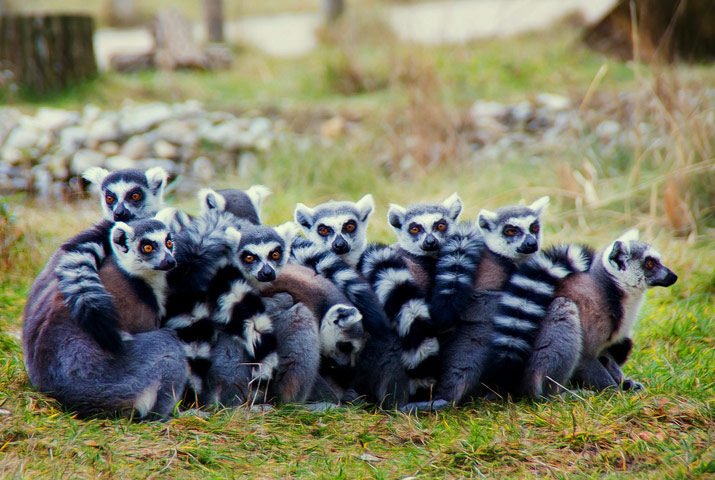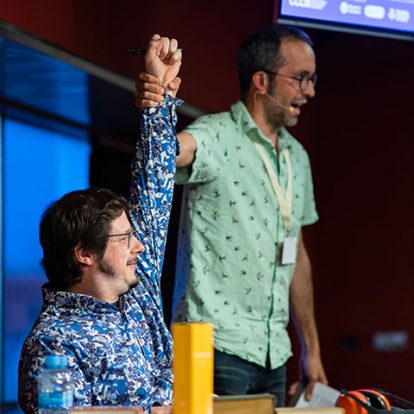Non-human intelligence
Eva Rexach
09 March 2017
Thinking that only humans are intelligent beings is wrong: there are other forms of intelligence that allow animals and plants to inhabit the world in different ways than we do. At Kosmopolis, we will talk about it with ecologists and experts in geobotany and animal neurobiology, and we will also discover the great potential of our brain.
In 2013, the video of a freed chimpanzee hugging his caretaker went around the whole world. It was not the first time it happened (Wounda was the fifteenth chimpanzee released), but if it went viral was because the monkey showed a “human” behavior, and because we could recognize ourselves in him. That was why we were moved.
Wounda’s caretaker was Jane Goodall, perhaps the best-known primatologist in the world. Goodall is co-director of the project Non Human Rights, an institution created in 2007 in the United States whose objective is that the law dictates that the animals are not “things” but “people” and, therefore, they have rights that must be respected. The Zürich-based foundation Animal in the Law (Stiftung für das Tier im Recht), founded in 1995, works along the same lines. And in some cases they have already achieved their purpose: in December 2015, a judge in Buenos Aires acknowledged this category to the female orangutan Sandra, who had lived in captivity for twenty years in the zoo of the Argentine capital. The case set a precedent and it’s considered a great victory for this association and for many animalist scientists and animal rights activists.
One of these scientists is Carl Safina, holder of a PhD in Ecology from Rutgers University, founding president of the Safina Center, and the first holder of the Endowed Research Chair for Nature and Humanity at Stony Brook University, where he co-chairs the steering committee of the Alan Alda Center for Communicating Science. According to Safina, “There is nothing singular in humans beings” and, for this reason, thinking that we are superior to them is just an example of narcissism. It is also narcissistic – or anthropocentric – thinking that animals do not communicate with each other, acting only by instinct: that they do not speak our “human” language does not mean that they do not have their own language. This is the reason why his book is titled Beyond Words: What Animals Think and Feel, and includes an introductory quote by Henry Beston, one of the fathers of the conservationist movement: “The animal shall not be measured by man. In a world older than ours they move finished and complete, gifted with extensions of the senses we have lost or never attained, living by voices we shall never hear…”

Green Intelligences
There is another type of intelligence more difficult to understand and detect. At least, it is an intelligence that has to do with perceptions and not with thoughts; an intelligence that allows beings to communicate with each other and with the land they inhabit, taking land in the literal sense of the term. We talk about the plants, the trees, the other inhabitants of the planet that we burn, cut and uproot like they were inanimate beings. And it seems that they are not inanimate at all.
Stefano Mancuso is one of the world’s experts in the field of plants’ neurobiology, author of an eloquent title book: Sensibility and Intelligence in the Plants World. According to Mancuso, plants react to touch, see the light, savor the proteins of the insects they capture and the nutrients of the soil where they are planted and detect the vibrations, as if they were listening. They are beings with senses and, therefore, sensitive ones. For this researcher, intelligence is the ability to solve problems, and plants are experts at it, as they can survive in unusual environments. “We are used to consider intelligence in relation to humans and animals that resemble us… That does not happen with plants: they do not have faces or organs, and their times are very different”, explains Mancuso. “That’s why we have trouble identifying them as intelligent beings”.
However, we all know that plants are essential for survival and, thanks to them, we can breathe and our world is livable. The geobiologist Hope Jahren knows a lot about it because she is the author of a book that has great reviews: Lab Girl. Jahren is not only a great expert in the plant life, but also an excellent writer able to describe the sound that plants make while they grow and the peculiarities of some species. While she remembers how she discovered his passion for botany, she denounces sexism situations in the world of science, explains how complicated it is to set up a laboratory with small budgets or describe her episodes of bipolarity. Jahren masterfully connects science with life, perhaps because science is her life, and this makes fascinating reading and listening to her.
Extraordinary Intelligences
So, Mancuso, Safina and Jahren will explain at Kosmopolis that there are intelligences in many cases superior to the human one and a level of communication that surpasses our abilities. However, there are some people who have capabilities that are way over the usual of the rest of humans. We talk about people who blow up the idea we have of the brain, because they show us what this fascinating organ is capable of. Daniel Tammet is one of such persons. Diagnosed with autism and the Savant syndrome, Tammet is a synaesthetic and a true genius in mathematics. He is able, among other things, of reciting the number pi for five hours or of learning a language in a week, but, above all, he is able to explain the beauty behind the figures. And also the beauty behind the letters because Tammet has published five books and is a mathematician who makes a living on Literature. We will discover some of his linguistic and numerical skills at Kosmopolis thanks to another expert in letters: Màrius Serra, in a talk that will allow us to approach a mind that seems boundless.









